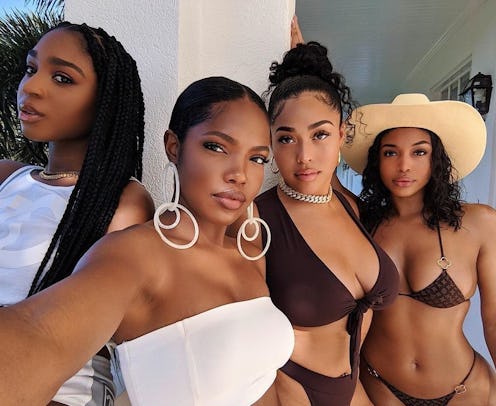(Skin)
Yes, Black Skin Still Needs Sunscreen — Here’s Why

There's been a longstanding misconception that Black people don't need to wear SPF. Yes, the risks of melanoma and burning are a lot higher in those with fairer skin, but this notion that those with more melanin don't have to wear it at all just isn't true. In fact, there are a number of benefits of sunscreen for black skin that go way beyond protection. The relationship between melanin skin and sunscreen is actually a lot more complex than you might expect and a variety of professionals on the subject matter are sounding off, below.
So where exactly did the idea that Black people don't need to wear sunscreen come from? Dr. Karen Chinonso Kagha, M.D. FAAD, a Cosmetic and Laser Fellow at Harvard University, explains to TZR that while Black people do need to wear sunscreen, there is some truth behind our skin shielding itself from burning. "Melanin in darker skin types has a photo-protective role and provides a natural protection factor," Dr. Kagha says via email. People with darker skin naturally have a higher amount of sun protection of up to 13 according to Winchester Hospital, while light skin has a natural SPF of 3.4. "Though there is some level of natural coverage offered to Black people, it's not enough and SPF is definitely needed," Kagha adds.
When it comes to finding the one that's right to you, New York esthetician Simedar Jackson cites the two major types as physical and chemical. "Physical sunscreens are made from minerals — like, zinc oxide and titanium dioxide — which creates that white cast left on the skin," she states. These are the traditional sunblocks you're most familiar with. "Chemical sunscreens are going to be a lot thinner, to absorb into the skin, and tend to go on more clear-casting", Jackson clarifies. General concerns about the true safety of newer, chemical formulas began to rise after the U.S. Food & Drug Association (FDA) released a report in 2019, which called for more studies to be done in order for them to be deemed toxic or not. Doctors found that even after one use, remnants of these chemicals were showing up in the bloodstream. This proves that as one of the few skincare categories regulated by the FDA, sunscreens take a good number of testing.
Much like creating a sunscreen that features nontoxic ingredients, tailoring that same product to better suit darker skin tones is no easy feat. Determined to do both, Black Girl Sunscreen's founder Shontay Lundy, launched her brand in 2016. "Our mission is to always provide products that are affordable, environmentally friendly, cruelty-free, and vegan", Quiana Johnson, the brand's Marketing Coordinator, tells TZR. "But in changing our formula, a lot of manufacturers were saying no, because they're used to those traditional brands that include toxins and other ingredients that don't fit within our demographic. We just took the no as a next opportunity."
There are a slew of sunscreen products that cater to the specific needs of people with darker skin tones — see below for the best picks.
We at TZR only include products that have been independently selected by our editors. We may receive a portion of sales if you purchase a product through a link in this article.
It Reduces Fine Lines & Wrinkles
Most chemical and physical sunscreens are designed to shield against photo-aging from the sun's UV rays. Signs of aging include fine lines and wrinkles — and slathering on some SPF at the end of your daily routine can help prevent those symptoms, should you choose.
It Helps Evens Skin Tone
Noted by Dr. Kagha as "one of the most common complaints in people with darker skin," the sun increases hyperpigmentation and wearing sunscreen will help prevent this.
It Protects The Skin From UV Rays
"Those with darker skin can still get skin cancer it often has a worse prognosis," Dr. Kagha notes. So if you know that you're going to be spending more time in the sun, you'll want to grab for protective sunscreen to reduce the risk of melanoma and burning.
It Helps With Skin Elasticity & Firmness
Another sign associated with photo-aging is the loss of collagen due to UV rays, which can sagging. Using sunscreen helps keep you looking fresh and rejuvenated while retaining the elasticity of your skin.
This article was originally published on